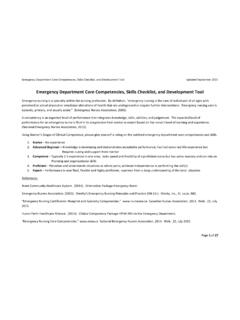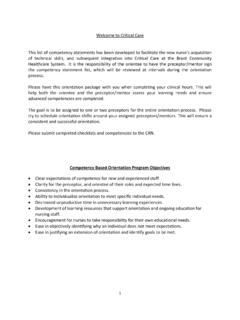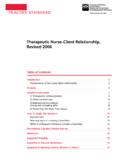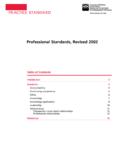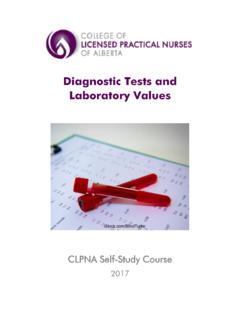Transcription of SURGICAL UNIT COMPETENCY BASED ORIENTATION
1 SURGICAL UNIT COMPETENCY BASED ORIENTATION Developed: 2014 Revised: 2018 Welcome to B5 SURGICAL Planned Care Value Stream COMPETENCY BASED ORIENTATION COMPETENCY BASED ORIENTATION Defines skills and expectations required to perform the job safely and effectively Provides a blueprint for performance excellence Evaluates performance and identifies skill and COMPETENCY gaps Defines resources available to aid new staff in meeting expectations Provides a map for ongoing direction and support Describes expectations of preceptor for teaching and validation Outputs of the learning experience What is Competence Competence is ability of a nurse to integrate & apply the knowledge, skills, judgements, attitudes.
2 Values and beliefs required to practice safely and ethically in a designated role or setting. (CNO 2008) Competencies can be defined as a set of statements about the knowledge, skills, attitudes and judgements required to perform safely within the scope of an individual s nursing practice or in a designated role or setting. (CNO 2008) Continuing competence is the ongoing ability to integrate & apply knowledge, skills & judgement required to practice safely and ethically. It involves a continual process of linking the code of ethics, standards of practice & lifelong learning. Reflection and continued practice improvement is an ongoing process. 1 Scope of practice defines activities that nurses are educated and authorized to perform as set out in jurisdictional legislation.
3 (CNO 2008) Self Assessment is defined as learners taking initiative to assess their own education needs, set goals and objectives, plan and identify appropriate educational activities, implement these activities and evaluate the outcomes. BENEFITS, BELIEFS AND GUIDING PRINCIPLES OF A COMPETNENCY BASED ORIENTATION PROGRAM 1. Provides safe practice & identifies expectations of competence per codes of ethics & standards of practice. 2. Defines a required behavior within a job role. 3. Provides consistency in the ORIENTATION process. 4. Links individual performance to goals of the organization. 5. Individualizes the ORIENTATION process to meet individual needs. 6. Provides ongoing direction and support to staff. 7. Encourages individuals to take responsibility for their own educational needs.
4 8. Monitors performance & identifies when an individual does not meet expectations. 9. Provides justification for an extension of the ORIENTATION process & identifying goals to be met. 2 Summary This section has identified the College's expectations of entry-level RNs and practice settings with regard to practice decision-making. The framework and elements to support decision-making have been described. Practice experience will further contribute to the development of skills and confidence in making nursing practice decisions that promote quality client care. Decision Tree: A Guide to Practice Decision Making for the Entry-Level registered nurse Assessment Gather the data. Analyze the data Determine if help needed to analyze data: NO Can I make sense of the data?
5 Is the assessment corrYfS., Consult/collaborate. Identify options of care Can Iidentify: A range of care options? NO The indications and contraindications for each? The client's preferences? YES Consult/collaborate . Choose the care option NO Am Isatisfied that the option chosen is the best, most appropriate? * Consult/collaborate. YES Do Ihave the authority to pr011ide the care? NO YES NO Can I get it (physician s order)? YES Am Icompetent to perform the care? Can Imanage the potential outcomes? YES NO Perform care Seek assistance Evaluate care Has care achieved the desired outcome? NO YES Reassess. End ..The nurse 's advocacy efforts m;r.; be required in situations where efforts to obtain a physician's order for the care option identified by the nurse as "the best and most appropriate" have been unsuccessful.
6 Adapted for College of Nurses of Ontario 27 A guide to practice decision-making for the entry-level RPN Has the acuity of the client been established? NO Complete assessment and analyze the data Do I have a complete understanding of the data? Is the assessment complete? Have I met the consultation requirements? NO YES Consult/collaborate. Choose the care option(s) (in consultation) NO Consult/collaborate. Am I satisfied that the option chosen is the best, most appropriate?* YES Do I have the authority to provide the care? Can I get it NO ( , physician s order)? YES YES Does the COMPETENCY require consultation? NO YES Am I competent to perform the care? Can I manage the NO potential outcomes? YES Does my "consultant" have the required knowledge, skill and judgment to perform NO the COMPETENCY independently?
7 YES Perform care. YES YES Seek assistance. Evaluate care Has care achieved the desired outcome? NO YES Reassess. End. * The nurse s advocacy efforts may be required in situations where efforts to obtain a physician s order for the care option identified by the nurse as the best and most appropriate have been unsuccessful. College of Nurses of Ontario Entry-to-Practice Competencies for Ontario registered Practical Nurses 13 C KEY POINTS ABOUT COMPETENCY BASED ORIENTATION AND EDUCATION Learning is a process that should continue along the continuum of novice to expert. COMPETENCY must be assessed at 3 levels: 1. Technical 2. Critical Thinking 3. Interpersonal Skills Traditionally, the technical component has been focused on during ORIENTATION ; however, most performance issues arise due to critical thinking or relational components.
8 Methods of assessing competence should be varied, & include Self assessment Preceptor assessment Written Tests Return Demonstrations Mock scenarios Observation of care given / tasks performed Medworxx SURGICAL Unit Competence Program Components 1. Interprofessional Communication 2. Teamwork 3. Knowledge BASED Practice 3 B5 SURGICAL COMPETENCY BASED ORIENTATION GREAT PLACE INTERPROFESSIONAL TO WORK COMMUNICATION TEAMWORK PATIENTS FIRST GOAL Performance Excellence within The Organization USING RESOURCES KNOWLEDGE BASED WISELY PRACTICE The ORIENTATION Process Initial Meeting with Manager Once hired you will meet with the Clinical Manager or the Clinician for the unit you will be reporting to.
9 You will receive the ORIENTATION folder. Your Role Model/Mentor will explain the ORIENTATION program and answers questions Your Role Model/Mentor will provide you with an ORIENTATION of the unit and hospital way finding. You will be asked to complete the clinical experience rating of the COMPETENCY BASED assessment tool. The new staff member, Role Model/Mentor will establish a plan for ORIENTATION BASED on the identified learning needs. Mid- ORIENTATION Evaluation The Role Model/Mentor will meet with the new staff member to Review the COMPETENCY BASED assessment to identify strategies to meet learning needs End of ORIENTATION The Role Model/Mentor will meet with the new staff member to: Review the COMPETENCY BASED assessment for incomplete items, establish a learning plan for meeting learning needs.
10 Evaluate the need for further ORIENTATION Suggest ongoing resources BASED on continuing learning needsOrientee: Preceptors: Important Phone Extensions Phone Numbers Extensions Hospital Numbers Switchboard 519-752-7871 back door 519-751-5544 Patient Registration 2253 B5 Desk 2310 Clinical Director Chris Churchill Clinical Manager Jordon Dewar 4282 PACU 4801 Clinician 2678 Staff Phone Numbers see staff scheduling folder B5 sick calls SICK CALLS For days call the night before if possible or by 0530 am For Nights Call by 1400 If an extended sick leave call org health @2248 519 751 5544 EXT 2310 Human Resources 5526 Payroll 2428 IT Help Desk HELP - 4357 e-Learning Medworxx.


